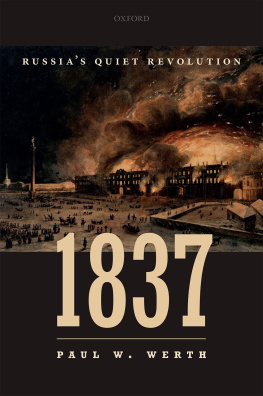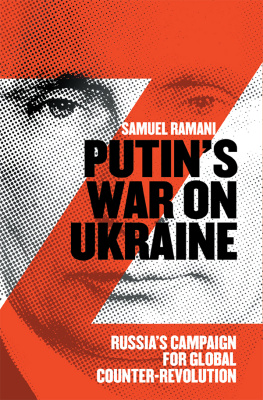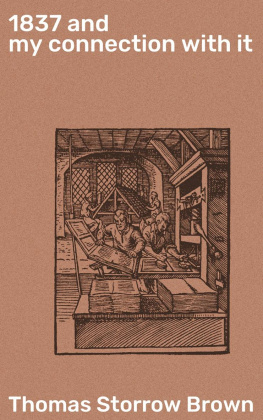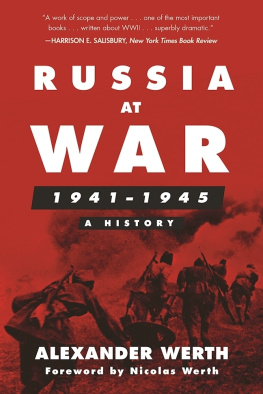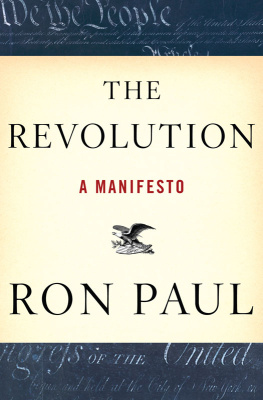1837

Great Clarendon Street, Oxford, OX2 6DP, United Kingdom
Oxford University Press is a department of the University of Oxford. It furthers the Universitys objective of excellence in research, scholarship, and education by publishing worldwide. Oxford is a registered trade mark of Oxford University Press in the UK and in certain other countries
Paul W. Werth 2021
The moral rights of the author have been asserted
First Edition published in 2021
Impression: 1
All rights reserved. No part of this publication may be reproduced, stored in a retrieval system, or transmitted, in any form or by any means, without the prior permission in writing of Oxford University Press, or as expressly permitted by law, by licence or under terms agreed with the appropriate reprographics rights organization. Enquiries concerning reproduction outside the scope of the above should be sent to the Rights Department, Oxford University Press, at the address above
You must not circulate this work in any other form and you must impose this same condition on any acquirer
Published in the United States of America by Oxford University Press
198 Madison Avenue, New York, NY 10016, United States of America
British Library Cataloguing in Publication Data
Data available
Library of Congress Control Number: 2020949424
ISBN 9780198826354
ebook ISBN 9780192560889
DOI: 10.1093/oso/9780198826354.001.0001
Printed and bound by
CPI Group (UK) Ltd, Croydon, CR0 4YY
Links to third party websites are provided by Oxford in good faith and for information only. Oxford disclaims any responsibility for the materials contained in any third party website referenced in this work.
Preface
Someone offering a book about Russia in 1837 has some explaining to do. People familiar with the Russian past will recall that Alexander Pushkin, Russias greatest poet, was killed in a duel that year. Some perhaps know that Russias first railway appeared then as well. But most would be hard-pressed to identify much else of note. Other years in Russian history would seem better candidates for the kind of year book that has become so prominent in popular historical works. Yet the central task of this book is to demonstrate precisely that 1837, despite initial appearances to the contrary, was exceptionally eventful and consequential for Russian history, and thatexaggerating slightlyone cannot really comprehend Russia without understanding this year.
The project grows out of research I have done over nearly three decades, mostly on religious matters, that repeatedly drew my attention to critical shifts occurring in the 1830s. The more I explored diverse realms of Russias history, the more compelling I found that initial observation to be. In an ideal world, I might have focused on a quadrennium (183639), but neither the word (quadrennium) nor the period (four years) works well from a marketing standpoint, so I concluded that a single year would have to do. Pushkins death created a strong argument for 1837, and further exploration revealed that, with some stretching here and there, I could make it work. When it occurred to me that both my home city of Chicago and my undergraduate alma mater (Knox College) were founded in 1837, I knew that fate was kicking me in the pants to get on with the project. Whether there is any merit to it is for the reader to decide.
At least three exist for Russia: Wayne Dowler, Russia in 1913(DeKalb, 2010); Karl Schlgel, Moscow, 1937, trans. Rodney Livingstone (Malden, MA, 2012); and Kathleen Smith, Moscow, 1956: The Silenced Spring(Cambridge, MA, 2017). I propose that there were also important years before the 20th c.
Acknowledgements
Stephanie Ireland, David McDonald, Elizabeth Nelson, Willard Sunderland, and the late Andrew Bell (19632017) were enthusiastic about this project when I myself still feared it to be silly and self-indulgent. At an early stage, the Berkeley Russian history kruzhokoffered confirmation that the project was indeed worth pursuing, and I thank Clarissa Ibarra for the invitation. Portions of the book benefited from discussions at the European University in St Petersburg, the University of Tokyo, the University of Washington, New York University, the Higher School of Economics in Moscow, Nazarbayev University (Kazakhstan), Arizona State University (the Desert Workshop in Russian History, Year Three), Ural Federal University (Yekaterinburg), and the University of Nevada in Las Vegas. Numerous individual colleagues provided me with ideas, critiques, materials, answers to questions, and in some cases alcohol: Yoko Aoshima, Nadezhda Balatskaia, Greg Brown, Elena Campbell, David Darrow, Mikhail Dolbilov, Jeff Eden, Catherine Evtuhov, Victoria Frede, Gary Hamburg, Mami Hamomoto, John Hay, James Howard, Hubertus Jahn, Joanna Kepka, Igor Khristoforov, Yanni Kotsonis, Scott Levi, Mariia Lukovskaia, Olga Maiorova, Mark Mazower, Susan McCaffrey, Natalia Mazur, Patrick Michelson, David Moon, Alexander Morrison, Norihiro Naganawa, Ekaterina Pravilova, Stephen Riegg, Jeff Schauer, Benjamin Schenk, Taku Shinohara, Jeff Simpson, Barbara Skinner, Susan Smith-Peter, Darius Stalinas, Gulmira Sultangalieva, Benjamin Tromley, Ulzhan Tuleshova, Arya Udry, Teddy Uldricks, Elena Vishlenkova, Aleksei Volvenko, Richard Wortman, and Daniil Zavlunov.

